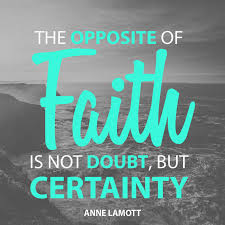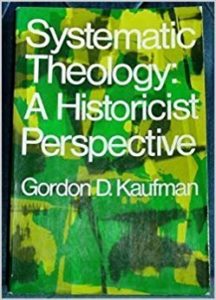- Faith does not inoculate us from struggle.
- Religious practice does not protect us from calamity.
My spiritual autobiography written my first semester in seminary (I wrote about it on Tuesday), did not include these observations. It was an airbrushed account of a well-intentioned, but largely unexamined faith. The description of my family was idealized by someone who had not strayed far from home emotionally. My faith was an account of what I thought faith should look like, a faith not daunted by doubts, a faith that rises above disappointment or disaster. A faith that conveyed certainty.
 What’s interesting to me was that by the time I wrote that paper, I had known disappointment and betrayal, I had experienced the death of friends, I had felt deep uncertainty. I had simply not incorporated those experiences into my understanding of faith. They were antithetical to my ideas of faith, so I had kept them at an emotional arm’s length rather than considering how they might inform my faith. My artificial certainty was standing in the way of my understanding.
What’s interesting to me was that by the time I wrote that paper, I had known disappointment and betrayal, I had experienced the death of friends, I had felt deep uncertainty. I had simply not incorporated those experiences into my understanding of faith. They were antithetical to my ideas of faith, so I had kept them at an emotional arm’s length rather than considering how they might inform my faith. My artificial certainty was standing in the way of my understanding.
I have written two spiritual autobiographies since that squeaky-clean one in seminary. One was an assignment in my Clinical Pastoral Education class at the Episcopal Seminary at a time I was slowly burning out in youth ministry. The other was in the middle of my career as a psychologist for a talk I did during Lent. Each was dramatically different from the first, and both represented a deeper appreciation for the way life simultaneously batters and strengthens faith when we let the lessons in.
Faith and doubt are not opposites. They are inseparable. One informs and shapes the other. They are dialectical. Speaking of dialectical, one final story.
 The seminary professor who had the biggest impact on me was also someone I rarely understood. William Hendricks taught Systematic Theology. Each day’s lecture contained words I would jot down and look up later. It took me most of the semester to begin to appreciate his “dialectic approach” to understanding theology. The assigned text was intellectually and theologically beyond my grasp, and it didn’t tell me what to believe, as I assumed it should. In a one-on-one meeting with him, I told him what a difficult time I was having understanding the book. After some conversation, he summed up my situation with a question/statement, “So you’ve never learned to read critically.”
The seminary professor who had the biggest impact on me was also someone I rarely understood. William Hendricks taught Systematic Theology. Each day’s lecture contained words I would jot down and look up later. It took me most of the semester to begin to appreciate his “dialectic approach” to understanding theology. The assigned text was intellectually and theologically beyond my grasp, and it didn’t tell me what to believe, as I assumed it should. In a one-on-one meeting with him, I told him what a difficult time I was having understanding the book. After some conversation, he summed up my situation with a question/statement, “So you’ve never learned to read critically.”
“No sir, I haven’t.” It was at that moment I decided it was time. I think we must do the same with how our experiences, particularly the painful ones, relate to faith.
0 Comments until now
Add your Comment!